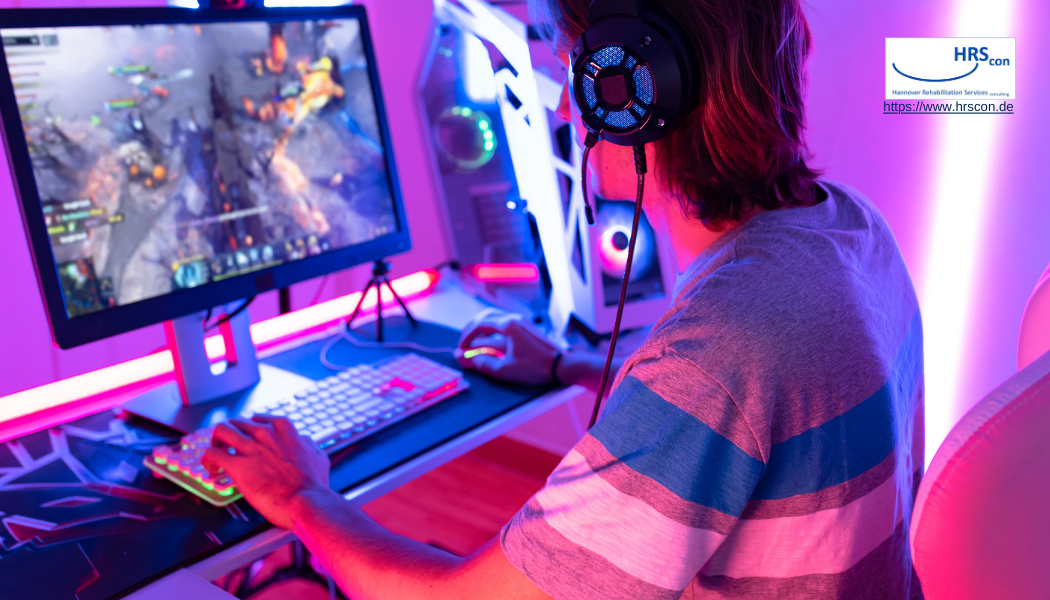In today’s hyper-connected world, online gaming has emerged as both a pastime and a competitive profession. However, for many adolescents, this digital engagement has turned into a serious behavioral concern—online gaming addiction (OGA). Recent research published in the International Journal of Mental Health and Addiction sheds light on the deeper psychological drivers of this addiction, revealing how unmet basic psychological needs, a lack of responsibility, and an absence of meaning in life propel adolescents toward excessive gaming.
This article delves into the study’s findings, highlighting critical factors and actionable strategies to mitigate the effects of this growing phenomenon.
What is Online Gaming Addiction?
Online gaming addiction is characterized by an overwhelming compulsion to play video games, disrupting essential aspects of life such as education, social relationships, and mental health. Key indicators of OGA include:
- Excessive gaming that takes precedence over daily responsibilities.
- Emotional dependency on gaming as a coping mechanism.
- Negative effects on interpersonal relationships and well-being.
According to the study, adolescents play an average of 3.56 hours daily, with some using gaming as an escape from stress, anxiety, or dissatisfaction with their offline lives.
Study Findings: The Psychology Behind OGA
Researchers studied 546 adolescents aged 15–18, using a theoretical framework grounded in Self-Determination Theory (SDT). They explored the relationship between basic psychological needs, meaning in life, responsibility, and gaming addiction.
Key Discoveries
- Unmet Basic Psychological Needs: Adolescents whose needs for autonomy, competence, and relatedness were not met in real life showed a greater tendency to develop OGA.
- Role of Responsibility: Adolescents with a low sense of personal or social responsibility were more susceptible to gaming addiction.
- Importance of Meaning in Life: Those with a strong sense of purpose or direction were less likely to rely on gaming to fill emotional voids.
Correlations at a Glance
| Variable | Impact on OGA | Significance |
|---|---|---|
| Autonomy | Negative (-0.23)** | A lack of independence drives escapism into gaming. |
| Competence | Negative (-0.18)** | Unfulfilled skill mastery pushes adolescents to seek validation in games. |
| Relatedness | Negative (-0.20)** | Lack of social connection fosters dependency on gaming for belonging. |
| Responsibility | Strong Negative (-0.30)** | Higher responsibility reduces gaming hours. |
| Meaning in Life | Moderate Negative (-0.19)** | A purposeful life offsets addictive tendencies. |
The Digital Dilemma: How Online Gaming Addiction Shapes Adolescents’ Lives
Introduction
In today’s hyper-connected world, online gaming has emerged as both a pastime and a competitive profession. However, for many adolescents, this digital engagement has turned into a serious behavioral concern—online gaming addiction (OGA). Recent research published in the International Journal of Mental Health and Addiction sheds light on the deeper psychological drivers of this addiction, revealing how unmet basic psychological needs, a lack of responsibility, and an absence of meaning in life propel adolescents toward excessive gaming.
This article delves into the study’s findings, highlighting critical factors and actionable strategies to mitigate the effects of this growing phenomenon.
What is Online Gaming Addiction?
Online gaming addiction is characterized by an overwhelming compulsion to play video games, disrupting essential aspects of life such as education, social relationships, and mental health. Key indicators of OGA include:
- Excessive gaming that takes precedence over daily responsibilities.
- Emotional dependency on gaming as a coping mechanism.
- Negative effects on interpersonal relationships and well-being.
According to the study, adolescents play an average of 3.56 hours daily, with some using gaming as an escape from stress, anxiety, or dissatisfaction with their offline lives.
Study Findings: The Psychology Behind OGA
Researchers studied 546 adolescents aged 15–18, using a theoretical framework grounded in Self-Determination Theory (SDT). They explored the relationship between basic psychological needs, meaning in life, responsibility, and gaming addiction.
Key Discoveries
- Unmet Basic Psychological Needs: Adolescents whose needs for autonomy, competence, and relatedness were not met in real life showed a greater tendency to develop OGA.
- Role of Responsibility: Adolescents with a low sense of personal or social responsibility were more susceptible to gaming addiction.
- Importance of Meaning in Life: Those with a strong sense of purpose or direction were less likely to rely on gaming to fill emotional voids.
Correlations at a Glance
| Variable | Impact on OGA | Significance |
|---|---|---|
| Autonomy | Negative (-0.23)** | A lack of independence drives escapism into gaming. |
| Competence | Negative (-0.18)** | Unfulfilled skill mastery pushes adolescents to seek validation in games. |
| Relatedness | Negative (-0.20)** | Lack of social connection fosters dependency on gaming for belonging. |
| Responsibility | Strong Negative (-0.30)** | Higher responsibility reduces gaming hours. |
| Meaning in Life | Moderate Negative (-0.19)** | A purposeful life offsets addictive tendencies. |
The Gaming Trap: Why Adolescents Turn to Virtual Worlds
Basic Psychological Needs and Gaming
At the heart of SDT are three psychological needs:
- Autonomy: Adolescents need a sense of control over their decisions and lives. Games often provide a virtual space where they can exercise this freedom.
- Competence: The thrill of mastering challenges in games offers a substitute for real-life achievements.
- Relatedness: Multiplayer games create virtual communities, fulfilling the need for connection and belonging.
When these needs go unmet in the real world, adolescents gravitate toward gaming to compensate, even if it leads to addiction.
Meaning in Life and Gaming
The study highlights a direct link between a lack of meaning in life and OGA. Adolescents with unclear goals or diminished purpose often resort to gaming as a form of escape, finding temporary satisfaction in virtual achievements.
Expert Insight: “Gaming provides a facade of accomplishment, but without real-life meaning, it becomes an addiction rather than recreation,” explains Dr. Mark D. Griffiths, a leading behavioral psychologist.
The Responsibility Factor
Responsibility—both personal and social—is a key protective factor against gaming addiction. Adolescents with a strong sense of accountability toward their families, education, and communities are less likely to overindulge in gaming. Conversely, those who shirk responsibilities are more prone to OGA, often neglecting daily tasks and obligations in favor of screen time.
Consequences of Online Gaming Addiction
The impact of OGA extends far beyond gaming hours, affecting adolescents’ overall well-being:
1. Academic Decline
Excessive gaming disrupts focus and time management, leading to poor grades and decreased school engagement.
2. Mental Health Challenges
Studies link OGA to heightened anxiety, depression, and social withdrawal. Adolescents struggling with gaming addiction often report feeling trapped in a cycle of dependency.
3. Physical Health Risks
Sedentary behavior, coupled with irregular eating and sleeping patterns, contributes to obesity, fatigue, and other health concerns.
Tackling Online Gaming Addiction: A Path Forward
1. Fulfilling Basic Psychological Needs
Parents, educators, and communities can work to address unmet psychological needs, creating environments where adolescents feel:
- Empowered to make decisions (autonomy).
- Confident in their abilities (competence).
- Connected to supportive relationships (relatedness).
2. Instilling Responsibility
Encourage adolescents to take ownership of their actions through:
- Assigning household duties to build accountability.
- Encouraging volunteerism and community engagement.
3. Fostering a Sense of Meaning
Adolescents with a clear purpose are less likely to turn to gaming for fulfillment. Suggestions include:
- Helping them set personal and academic goals.
- Guiding them toward hobbies and interests that offer intrinsic satisfaction.
4. Limiting Gaming Exposure
Parents and guardians can use technology to regulate gaming habits:
- Implement screen time restrictions using parental controls.
- Encourage tech-free zones or hours in the household.
Broader Implications: Rethinking Gaming’s Role in Society
1. Ethical Game Design
Game developers must adopt ethical practices, such as:
- Limiting addictive reward mechanics.
- Offering reminders for breaks after prolonged gameplay.
2. Educational Interventions
Schools can incorporate digital literacy programs to raise awareness about gaming addiction and promote balanced technology use.
Visualizing the Addiction Cycle
Illustration Idea:
- A circular diagram depicting the cycle: unmet psychological needs → reliance on gaming → neglect of responsibilities → worsening psychological state → deeper gaming dependency.
Table: Protective Factors Against OGA
| Protective Factor | Examples |
|---|---|
| Fulfilling Needs | Encouraging autonomy, competence, relatedness. |
| Promoting Responsibility | Assigning chores, encouraging accountability. |
| Building Meaning in Life | Goal-setting, exploring hobbies and passions. |
| Limiting Gaming Exposure | Screen time regulations, creating tech-free zones. |
The Digital Dilemma: How Online Gaming Addiction Shapes Adolescents’ Lives
Introduction
In today’s hyper-connected world, online gaming has emerged as both a pastime and a competitive profession. However, for many adolescents, this digital engagement has turned into a serious behavioral concern—online gaming addiction (OGA). Recent research published in the International Journal of Mental Health and Addiction sheds light on the deeper psychological drivers of this addiction, revealing how unmet basic psychological needs, a lack of responsibility, and an absence of meaning in life propel adolescents toward excessive gaming.
This article delves into the study’s findings, highlighting critical factors and actionable strategies to mitigate the effects of this growing phenomenon.
What is Online Gaming Addiction?
Online gaming addiction is characterized by an overwhelming compulsion to play video games, disrupting essential aspects of life such as education, social relationships, and mental health. Key indicators of OGA include:
- Excessive gaming that takes precedence over daily responsibilities.
- Emotional dependency on gaming as a coping mechanism.
- Negative effects on interpersonal relationships and well-being.
According to the study, adolescents play an average of 3.56 hours daily, with some using gaming as an escape from stress, anxiety, or dissatisfaction with their offline lives.
Study Findings: The Psychology Behind OGA
Researchers studied 546 adolescents aged 15–18, using a theoretical framework grounded in Self-Determination Theory (SDT). They explored the relationship between basic psychological needs, meaning in life, responsibility, and gaming addiction.
Key Discoveries
- Unmet Basic Psychological Needs: Adolescents whose needs for autonomy, competence, and relatedness were not met in real life showed a greater tendency to develop OGA.
- Role of Responsibility: Adolescents with a low sense of personal or social responsibility were more susceptible to gaming addiction.
- Importance of Meaning in Life: Those with a strong sense of purpose or direction were less likely to rely on gaming to fill emotional voids.
Correlations at a Glance
| Variable | Impact on OGA | Significance |
|---|---|---|
| Autonomy | Negative (-0.23)** | A lack of independence drives escapism into gaming. |
| Competence | Negative (-0.18)** | Unfulfilled skill mastery pushes adolescents to seek validation in games. |
| Relatedness | Negative (-0.20)** | Lack of social connection fosters dependency on gaming for belonging. |
| Responsibility | Strong Negative (-0.30)** | Higher responsibility reduces gaming hours. |
| Meaning in Life | Moderate Negative (-0.19)** | A purposeful life offsets addictive tendencies. |
The Gaming Trap: Why Adolescents Turn to Virtual Worlds
Basic Psychological Needs and Gaming
At the heart of SDT are three psychological needs:
- Autonomy: Adolescents need a sense of control over their decisions and lives. Games often provide a virtual space where they can exercise this freedom.
- Competence: The thrill of mastering challenges in games offers a substitute for real-life achievements.
- Relatedness: Multiplayer games create virtual communities, fulfilling the need for connection and belonging.
When these needs go unmet in the real world, adolescents gravitate toward gaming to compensate, even if it leads to addiction.
Meaning in Life and Gaming
The study highlights a direct link between a lack of meaning in life and OGA. Adolescents with unclear goals or diminished purpose often resort to gaming as a form of escape, finding temporary satisfaction in virtual achievements.
Expert Insight: “Gaming provides a facade of accomplishment, but without real-life meaning, it becomes an addiction rather than recreation,” explains Dr. Mark D. Griffiths, a leading behavioral psychologist.
The Responsibility Factor
Responsibility—both personal and social—is a key protective factor against gaming addiction. Adolescents with a strong sense of accountability toward their families, education, and communities are less likely to overindulge in gaming. Conversely, those who shirk responsibilities are more prone to OGA, often neglecting daily tasks and obligations in favor of screen time.
Consequences of Online Gaming Addiction
The impact of OGA extends far beyond gaming hours, affecting adolescents’ overall well-being:
1. Academic Decline
Excessive gaming disrupts focus and time management, leading to poor grades and decreased school engagement.
2. Mental Health Challenges
Studies link OGA to heightened anxiety, depression, and social withdrawal. Adolescents struggling with gaming addiction often report feeling trapped in a cycle of dependency.
3. Physical Health Risks
Sedentary behavior, coupled with irregular eating and sleeping patterns, contributes to obesity, fatigue, and other health concerns.
Tackling Online Gaming Addiction: A Path Forward
1. Fulfilling Basic Psychological Needs
Parents, educators, and communities can work to address unmet psychological needs, creating environments where adolescents feel:
- Empowered to make decisions (autonomy).
- Confident in their abilities (competence).
- Connected to supportive relationships (relatedness).
2. Instilling Responsibility
Encourage adolescents to take ownership of their actions through:
- Assigning household duties to build accountability.
- Encouraging volunteerism and community engagement.
3. Fostering a Sense of Meaning
Adolescents with a clear purpose are less likely to turn to gaming for fulfillment. Suggestions include:
- Helping them set personal and academic goals.
- Guiding them toward hobbies and interests that offer intrinsic satisfaction.
4. Limiting Gaming Exposure
Parents and guardians can use technology to regulate gaming habits:
- Implement screen time restrictions using parental controls.
- Encourage tech-free zones or hours in the household.
Broader Implications: Rethinking Gaming’s Role in Society
1. Ethical Game Design
Game developers must adopt ethical practices, such as:
- Limiting addictive reward mechanics.
- Offering reminders for breaks after prolonged gameplay.
2. Educational Interventions
Schools can incorporate digital literacy programs to raise awareness about gaming addiction and promote balanced technology use.
Visualizing the Addiction Cycle
Illustration Idea:
- A circular diagram depicting the cycle: unmet psychological needs → reliance on gaming → neglect of responsibilities → worsening psychological state → deeper gaming dependency.
Table: Protective Factors Against OGA
| Protective Factor | Examples |
|---|---|
| Fulfilling Needs | Encouraging autonomy, competence, relatedness. |
| Promoting Responsibility | Assigning chores, encouraging accountability. |
| Building Meaning in Life | Goal-setting, exploring hobbies and passions. |
| Limiting Gaming Exposure | Screen time regulations, creating tech-free zones. |
Conclusion: Restoring Balance in Adolescents’ Lives
Online gaming is a double-edged sword—providing entertainment and learning opportunities while risking addiction for vulnerable individuals. Addressing unmet psychological needs, fostering a sense of meaning, and instilling responsibility can empower adolescents to navigate the digital landscape healthily.
As gaming becomes an increasingly integral part of modern life, society must strike a balance between leveraging its benefits and mitigating its risks.
Call to Action
What are your thoughts on gaming addiction among adolescents? Share this article to raise awareness and join the conversation about creating a healthier digital future. Together, we can help the next generation thrive both online and offline.




